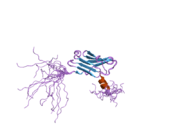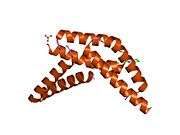CACYBP
Calcyclin-binding protein is a protein that in humans is encoded by the CACYBP gene.[3][4][5]
The protein encoded by this gene is a calcyclin binding protein. It may be involved in calcium-dependent ubiquitination and subsequent proteosomal degradation of target proteins. It probably serves as a molecular bridge in ubiquitin E3 complexes and participates in the ubiquitin-mediated degradation of beta-catenin. Two alternatively spliced transcript variants encoding different isoforms have been found for this gene.[5]
Interactions
CACYBP has been shown to interact with SKP1A[6] and SIAH1.[3]
References
- ↑ "Human PubMed Reference:".
- ↑ "Mouse PubMed Reference:".
- 1 2 Matsuzawa SI, Reed JC (Jun 2001). "Siah-1, SIP, and Ebi collaborate in a novel pathway for beta-catenin degradation linked to p53 responses". Mol Cell. 7 (5): 915–26. doi:10.1016/S1097-2765(01)00242-8. PMID 11389839.
- ↑ Matsuzawa S, Li C, Ni CZ, Takayama S, Reed JC, Ely KR (Jan 2003). "Structural analysis of Siah1 and its interactions with Siah-interacting protein (SIP)". J Biol Chem. 278 (3): 1837–40. doi:10.1074/jbc.M210263200. PMID 12421809.
- 1 2 "Entrez Gene: CACYBP calcyclin binding protein".
- ↑ Matsuzawa, S I; Reed J C (May 2001). "Siah-1, SIP, and Ebi collaborate in a novel pathway for beta-catenin degradation linked to p53 responses". Mol. Cell. United States. 7 (5): 915–26. doi:10.1016/S1097-2765(01)00242-8. ISSN 1097-2765. PMID 11389839.
Further reading
- Filipek A, Jastrzebska B, Nowotny M, et al. (2002). "Ca2+-dependent translocation of the calcyclin-binding protein in neurons and neuroblastoma NB-2a cells.". J. Biol. Chem. 277 (23): 21103–9. doi:10.1074/jbc.M111010200. PMID 11927578.
- Liu WX, Wu J, Zhao Z, et al. (2003). "[Cloning and expression of human calcyclin binding protein (hCacyBP) gene]". Sheng Wu Hua Xue Yu Sheng Wu Wu Li Xue Bao. 34 (2): 181–6. PMID 12006993.
- Filipek A, Jastrzebska B, Nowotny M, Kuznicki J (2002). "CacyBP/SIP, a calcyclin and Siah-1-interacting protein, binds EF-hand proteins of the S100 family.". J. Biol. Chem. 277 (32): 28848–52. doi:10.1074/jbc.M203602200. PMID 12042313.
- Strausberg RL, Feingold EA, Grouse LH, et al. (2003). "Generation and initial analysis of more than 15,000 full-length human and mouse cDNA sequences.". Proc. Natl. Acad. Sci. U.S.A. 99 (26): 16899–903. doi:10.1073/pnas.242603899. PMC 139241
 . PMID 12477932.
. PMID 12477932.
- Wu J, Tan X, Peng X, et al. (2004). "Translocation and phosphorylation of calcyclin binding protein during retinoic acid-induced neuronal differentiation of neuroblastoma SH-SY5Y cells.". J. Biochem. Mol. Biol. 36 (4): 354–8. doi:10.5483/bmbrep.2003.36.4.354. PMID 12895292.
- Ota T, Suzuki Y, Nishikawa T, et al. (2004). "Complete sequencing and characterization of 21,243 full-length human cDNAs.". Nat. Genet. 36 (1): 40–5. doi:10.1038/ng1285. PMID 14702039.
- Gerhard DS, Wagner L, Feingold EA, et al. (2004). "The status, quality, and expansion of the NIH full-length cDNA project: the Mammalian Gene Collection (MGC).". Genome Res. 14 (10B): 2121–7. doi:10.1101/gr.2596504. PMC 528928
 . PMID 15489334.
. PMID 15489334.
- Santelli E, Leone M, Li C, et al. (2005). "Structural analysis of Siah1-Siah-interacting protein interactions and insights into the assembly of an E3 ligase multiprotein complex.". J. Biol. Chem. 280 (40): 34278–87. doi:10.1074/jbc.M506707200. PMID 16085652.
- Rual JF, Venkatesan K, Hao T, et al. (2005). "Towards a proteome-scale map of the human protein-protein interaction network.". Nature. 437 (7062): 1173–8. doi:10.1038/nature04209. PMID 16189514.
- Ewing RM, Chu P, Elisma F, et al. (2007). "Large-scale mapping of human protein-protein interactions by mass spectrometry.". Mol. Syst. Biol. 3 (1): 89. doi:10.1038/msb4100134. PMC 1847948
 . PMID 17353931.
. PMID 17353931.
- Sun S, Ning X, Liu J, et al. (2007). "Overexpressed CacyBP/SIP leads to the suppression of growth in renal cell carcinoma.". Biochem. Biophys. Res. Commun. 356 (4): 864–71. doi:10.1016/j.bbrc.2007.03.080. PMID 17400182.
PDB gallery |
|---|
|
| 1x5m: Solution structure of the core domain of calcyclin binding protein; siah-interacting protein (SIP) |
| 2a26: Crystal structure of the N-terminal, dimerization domain of Siah Interacting Protein |
|
|
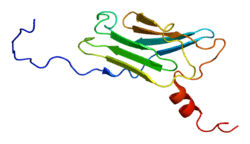
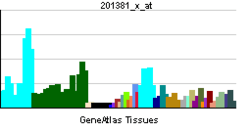
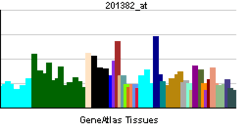
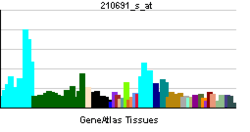
 . PMID 12477932.
. PMID 12477932. . PMID 15489334.
. PMID 15489334. . PMID 17353931.
. PMID 17353931.